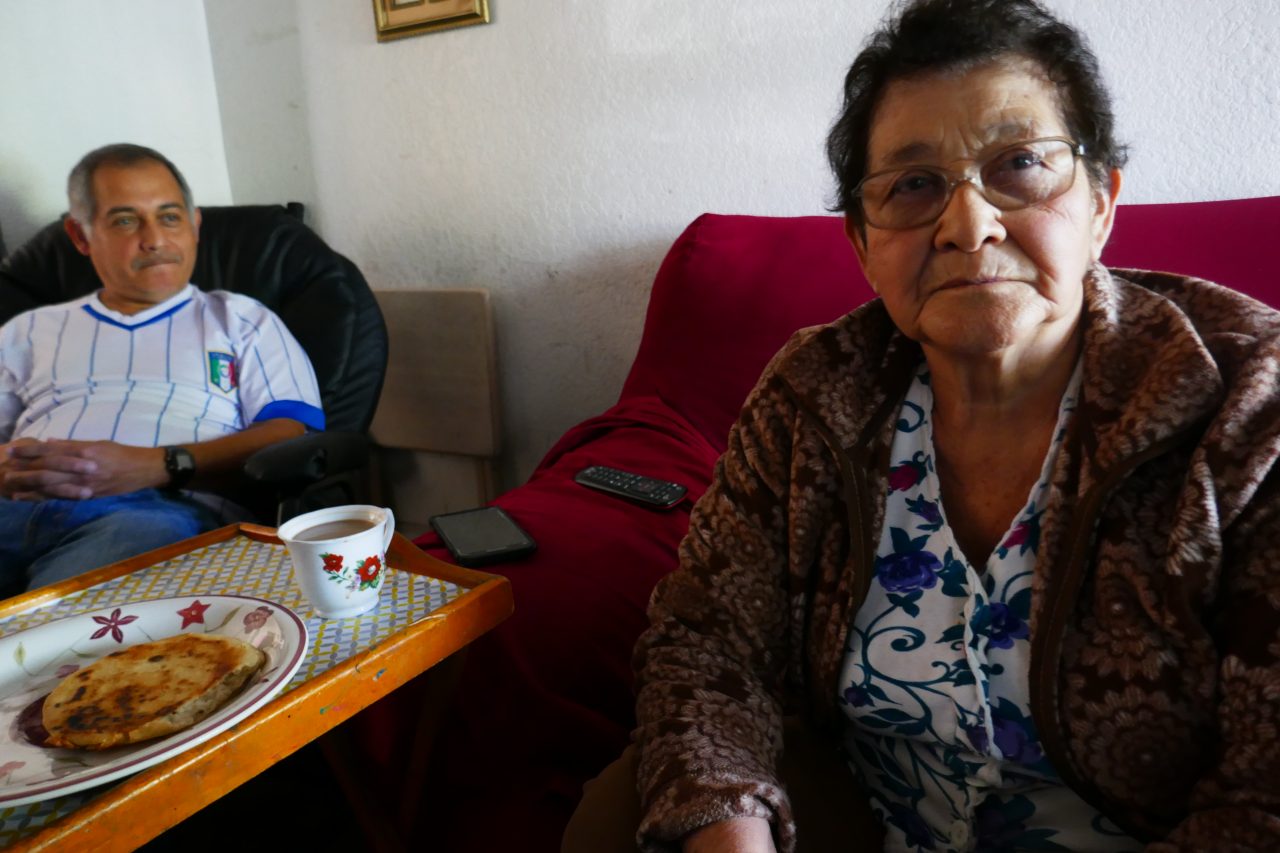 Cruz Cubias Castillo, 77, lives with her son Alejandro Cubias and his family. The only money she earns is from recycling cans and bottles. The green card holder qualifies for food assistance but won’t apply for it because she fears that could hurt her or her family later. Photo by Elizabeth Aguilera for CALmatters
Cruz Cubias Castillo, 77, lives with her son Alejandro Cubias and his family. The only money she earns is from recycling cans and bottles. The green card holder qualifies for food assistance but won’t apply for it because she fears that could hurt her or her family later. Photo by Elizabeth Aguilera for CALmatters
California Attorney General Xavier Becerra is labeling as unconstitutional the Trump administration’s proposed rule that would block some legal immigrants from getting a green card if they’ve used—or may use in the future—public services like health care, food assistance and housing programs.
Just hours before a midnight Monday deadline for comment, Becerra submitted a 51-page denouncement of the “public charge” rule, warning it would have “dire consequences for the vitality of California and undermine our State’s investment in our communities and our commitment to supporting working families.”
Since the proposal’s release, he has promised to take “any and all legal action to challenge this reckless proposal.” Becerra already has sued the Trump administration 42 times, with nine of those cases contesting President Trump’s immigration moves.
Becerra’s latest comment contends that the Trump administration has “utterly failed to account for the potential impact the Proposed Rule has on states and their residents, especially in California. The Rule will have truly damaging and irreparable ramifications to our State’s families, employers, economy, and public agencies for years to come.” It says the proposal unconstitutionally
targets immigrant communities of color and interferes with California’s administration of programs that benefit the health and safety of its residents.
The controversial proposal is viewed as another step in the Trump administration’s efforts to reduce migration from developing countries and make it more difficult for poorer immigrants to stay and potentially pursue a path to U.S. Citizenship. More than 115,000 comments have been filed nationwide in anticipation of the federal government issuing a final determination.
Historically the federal government has subjected certain immigrants applying for legal permanent residency, otherwise known as green cards, to a test to determine if they have ever been or would ever need to be supported by taxpayers. This “public charge” assessment is done at two points in the process—when people from abroad apply to enter the U.S., and when they apply to become a legal permanent resident. It has long focused on judging a person’s need for cash aid programs.
The new proposal would expand the list to include receiving food stamps, Medicaid (in California, Medi-Cal) health care and Section 8 housing assistance. It could affect immigrants here on worker visas who then apply for a green card, and those who apply for one after marrying U.S. citizens.
US Citizenship and Immigration Services, the federal agency, said it is making the change to better define guidance on how to determine if a person “applying for a visa, admission or adjustment of status is likely at any time to become a public charge.”
“Since the 1800s, federal laws have required foreign nationals to be able to care for themselves without being a public charge,” the agency’s director, Francis Cissna, said in a statement. “As such, it is incumbent upon the U.S. government to evaluate applications in a manner consistent with federal law, and I believe the public charge regulation is a necessary step to achieving that goal.”
The Trump administration estimates about 380,000 applicants nationwide may face additional scrutiny under the new rule.
But California forecasts a larger chilling effect because of the fear a rule change is likely to instill among the nearly 30 percent of the state’s population who are immigrants. Becerra’s letter said there are about 5 million Californians living in mixed-immigration status households, with at least one family member who is undocumented, and nearly 3 million children, most of them citizens, with immigrant parents receive public benefits.
The UCLA Center for Health Policy Research estimates that as many as 300,000 eligible people could cancel their enrollment in CAL Fresh, the state’s food stamp program, equaling up to $488 million dollars in annual benefits. For Medi-Cal, the center estimates a decline of up to 741,000 eligible people, accounting for more than $1 billion in funding for the health care coverage. The center’s research concludes the state could lose up to$1.67 billion in benefits, $2.8 billion from the economy and lose 17,700 jobs including in the health care, agriculture and other food related industries.
“The programs lift hundreds of thousands of Californians out of poverty,” said Ninez Ponce, director of the UCLA center. “There is a lot of confusion and fear and so children and families, parents, individuals who are wholly eligible and who have already adjusted to legal permanent status may be confused—and may think that this may threaten their continued pathway to citizenship, and so may dis-enroll.”
Supporters, however, argue the country should reserve benefits for citizens, especially those who are homeless or jobless and need support.
“When you look at what a poor job we are doing with our most vulnerable people (citizens), our inability to provide meaningful work, living wages, what sense does it make to bring in someone who is indigent or very marginal and could be a burden to the taxpayer,” said Kevin Lynn, executive director of Progressives for Immigration Reform, a group that supports limited immigration.
Becerra pointed out that most of the families using the supplemental services are working and need the assistance to make ends meet—especially low-wage workers in health care, agriculture and childcare. “Discouraging eligible immigrants from accessing Medi-Cal, (food stamps) and housing benefits, will ultimately transfer costs to state and local governments and community organizations, as those families rely on emergency services and public safety net programs, such as local shelters, homeless services and food pantries,” said Becerra, who also predicted a major impact on California’s agricultural and construction industries should immigrants choose to leave the state.
An analysis of the change by the Migration Policy Institute, a nonpartisan research organization, found that the new rule would shift immigration from Latin America to Europe. Researchers applied the new test to immigrants who have become legal permanent residents within the last five years and found that nearly 70 percent had at least one negative factor.
Currently immigration officers assess the public charge rule by considering a person’s age, health, family status, assets and resources and education and skills. New factors could also include if someone is a child or a senior, those with limited English proficiency, limited education and medical conditions.
The only positive factor for avoiding being classified as a public charge: if someone has financial assets or earns at or above 250 percent of the federal poverty level. That’s about $63,000 for a family of four.
Advocates say the new rules would favor wealthier immigrants, who tend to be white, and disproportionately harm women, children and the elderly. They report that legal immigrants are asking questions about how this rule will impact them and many are backing away from programs they qualify for, or that benefit their children.
“The majority of people who receive these benefits are working, so it’s really an unprecedented departure of our understanding of public charge to say that a person who is working but now is receiving supplemental assistance would be considered a public charge,” said Gabrielle Lessard, senior policy attorney for the National Immigration Law Center. “It’s narrowing who is able to fit through.”
Health providers, especially those in low-income immigrant areas, are already seeing the fallout from the proposal. People are afraid and asking to be disenrolled from programs or are refusing to sign-up even if they qualify.
“This is a vulnerable population and we are concerned about it because these residents are here legally and may be in need of health care, and we should be helping to keep them safe and well,” said Erik Wexler, chief executive of Southern California’s Providence St. Joseph Health, a health care provider that serves a predominantly lower-income Medi-Cal population.
Eisner Health, which provides health care to low-income residents in Los Angeles, said in its submitted public comment: “The effect of this rule could drive entire families away from enrolling in programs that help them stay healthy.”
Among Eisner’s patients is Cruz Cubias Castillo, who lives in South Los Angeles. She recently told an outreach worker there that she did not want to apply for CALFresh benefits after all. The 77-year-old green card holder wishes she could accept the benefit since she lives with her son and has no income except the few bucks she earns collecting cans and bottles to recycle. But she is afraid.
“I am embarrassed to not have any of my own food and I have to get from my son and his family,” she said. “It really pains me—he has his family and has a daughter in a wheelchair. He is the only one that works.”
Castillo has been in the United States for 17 years, and has held a green card since 2010. She worries that the government might come after her or her son later for whatever benefit she might receive, or that they might take away her green card if she accepts the food stamps. So she’s going to go without.
She is, however, taking her chances on one program: Castillo is staying on Medi-Cal and says she can’t quit because she suffers from diabetes.
In Los Angeles County more than 1 million immigrants receive CAL Fresh, cash aid through Temporary Assistance for Needy Families, Medi-Cal, and Section 8 benefits. If a quarter of those families drop their benefits, the county estimates that the local economy would lose more than $60 million.
“Our government should never be in the business of punishing people who may need a little help making sure their kids are safe, fed, and have a roof over their heads,” Los Angeles Mayor Eric Garcetti said in his submitted comment. “Creating fear and targeting legal immigrants who follow the rules does nothing to increase our security or strengthen our economy—it is nothing less than a public disgrace.”
https://calmatters.org/articles/trump_california/california-ag-labels-public-charge-unconstitutional-immigration-change/

